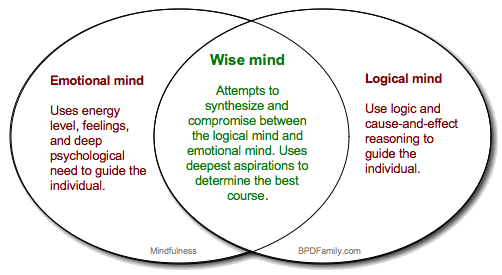What is mindfulness all about? In the simplest sense, we all develop, from time to time, thinking patterns that do not serve us well. When we do, we are easily "triggered" - having non-constructive reactions to specific words or actions based on prior experiences. We've all been there - in resentment, pessimism, defensiveness, impatience, closed mindedness, distrust, intolerance, confrontational, defeat...
Mindfulness is a type of self-awareness in which we learn to observe ourselves in real time to see and alter our reactions to be more constructive.
Thought is the Building Block of Our Reality
Cogito ergo sum ( "I think, therefore I am") is a philosophical Latin statement proposed by René Descartes. This is one of those things that is so obvious, and so rarely considered. The world around us is what we perceive in our minds. The blind man lives in a dark world. A paranoid man lives in a fearful world. A loving man lives in a loving world.
We are how we think.
The Mind is a Friend, Lover, Torturer, and Teacher
Our mind is the source of all misery and of all pleasure. People don’t effectively hurt our feelings or inspire us.
People can offer us their opinions, it is only that which the mind decides has any relevance that we take on for ourselves. Only the mind that can complement us, insult us, lift us, or destroy us.
We can influence this.
Reasonable/Logical mind, Wise Mind, Emotion Mind
Wise Mind is that place where reasonable mind and emotion mind overlap. It is the integration of emotion mind and reasonable/logical mind.
The goals of mindfulness practice are simply to practice and to experience “Wise Mind”. You’re in Wise Mind when your emotions and your thoughts work together so that wise action is easy, even when your life and/or circumstances are really hard. You’re in Wise Mind when you can meet each moment of life as it is, not as you would have it be, and respond to it skillfully.
Notice that we’re not saying the goal of mindfulness practice is happiness or having a life free from trouble or having an experience of nonstop joy. However, people who practice mindfulness will tell you that they get better at enduring pain, better at solving problems, better at not creating misery for themselves, and better at participating fully in those moments of life that are joyful.
How Do We Do This?
By paying attention to ourselves in real time. There are books written about this, but the short answer is to pay attention to yourself, observe yourself in a purposeful way, in the present moment, and without immediately overlaying the old filters on the situation.
What is mindfulness all about? In the simplest sense, we all develop, from time to time, thinking patterns that do not serve us well. When we do, we are easily "triggered" - having non-constructive reactions to specific words or actions based on prior experiences. We've all been there - in resentment, pessimism, defensiveness, impatience, closed mindedness, distrust, intolerance, confrontational, defeat...
Mindfulness is a type of self-awareness in which we learn to observe ourselves in real time to see and alter our reactions to be more constructive.
Thought is the Building Block of Our Reality
Cogito ergo sum ( "I think, therefore I am") is a philosophical Latin statement proposed by René Descartes. This is one of those things that is so obvious, and so rarely considered. The world around us is what we perceive in our minds. The blind man lives in a dark world. A paranoid man lives in a fearful world. A loving man lives in a loving world.
We are how we think.
The Mind is a Friend, Lover, Torturer, and Teacher
Our mind is the source of all misery and of all pleasure. People don’t effectively hurt our feelings or inspire us.
People can offer us their opinions, it is only that which the mind decides has any relevance that we take on for ourselves. Only the mind that can complement us, insult us, lift us, or destroy us.
We can influence this.
Reasonable/Logical mind, Wise Mind, Emotion Mind
Wise Mind is that place where reasonable mind and emotion mind overlap. It is the integration of emotion mind and reasonable/logical mind.

The goals of mindfulness practice are simply to practice and to experience “Wise Mind”. You’re in Wise Mind when your emotions and your thoughts work together so that wise action is easy, even when your life and/or circumstances are really hard. You’re in Wise Mind when you can meet each moment of life as it is, not as you would have it be, and respond to it skillfully.
Notice that we’re not saying the goal of mindfulness practice is happiness or having a life free from trouble or having an experience of nonstop joy. However, people who practice mindfulness will tell you that they get better at enduring pain, better at solving problems, better at not creating misery for themselves, and better at participating fully in those moments of life that are joyful.
How Do We Do This?
By paying attention to ourselves in real time. There are books written about this, but the short answer is to pay attention to yourself, observe yourself in a purposeful way, in the present moment, and without immediately overlaying the old filters on the situation.